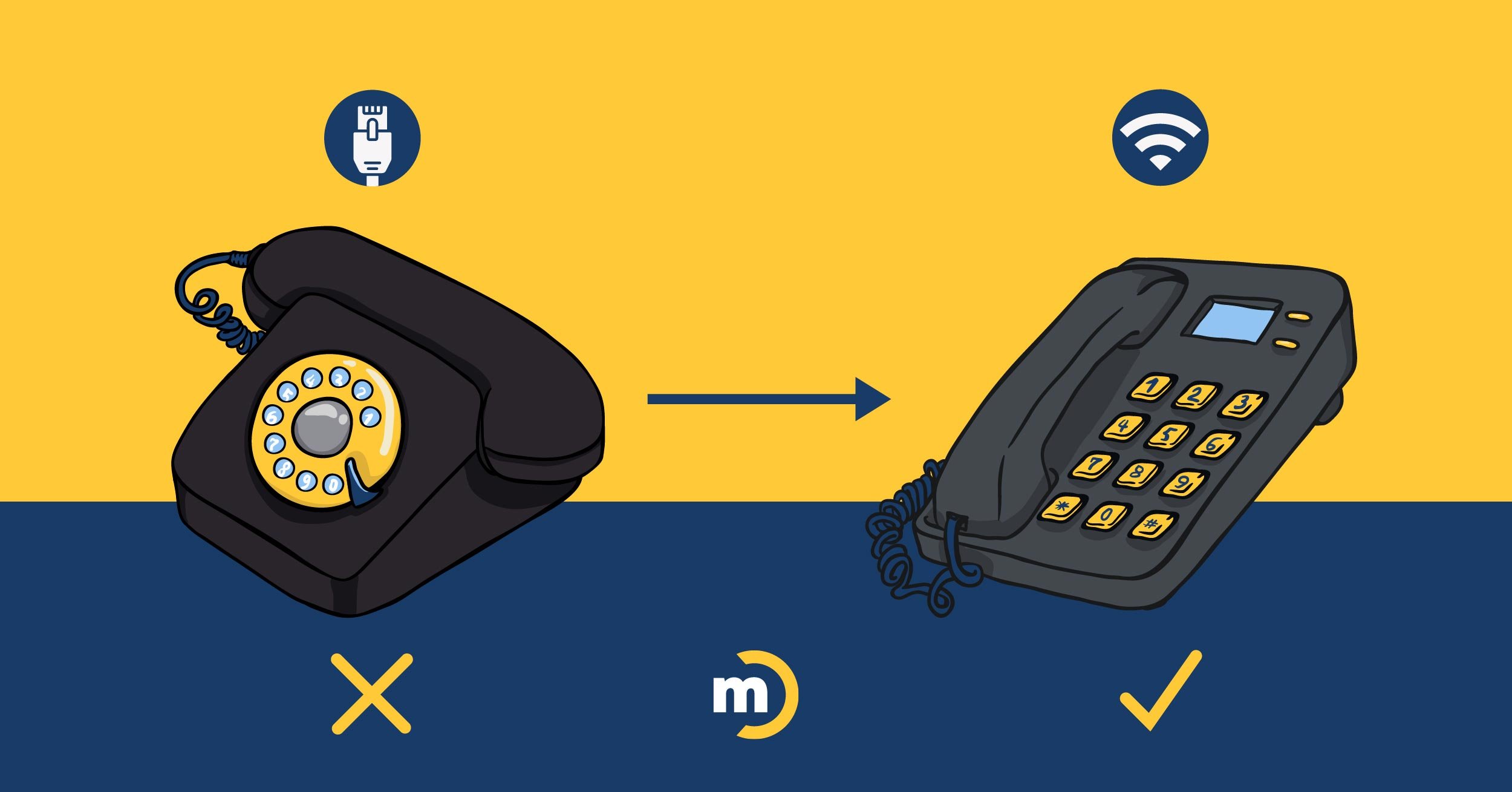Business technology isn’t immune to hype. And it’s natural enough for those who make their careers in tech to get overly excited from time to time about a new platform or a new gadget. It’s also natural enough for business owners to hang back a bit and see where their dollars might stretch the furthest.
Not every business really needs all the bells and whistles. But it’s hard to think of a top business problem that cloud-based phones don’t help solve. And while there are always exceptions, most organizations would benefit from making the switch. Hands down. I’ll go into the whys and wherefores, but first, here’s a little background info.
Cloud-Based Phone Systems Explained

VoIP (voice over internet protocol) technology has been around since 1995, and that term is now used interchangeably with cloud voice…although, if we’re going to split hairs about it, VoIP refers to the technology itself, and cloud voice refers to the method of delivering that technology.
There are many ways to define cloud-based phone systems, but I think the easiest way to wrap your head around it is through an analogy: Cloud-based phones did the same thing for the telecommunications industry that streaming services did for the entertainment industry. Both offer something similar to what the phone and major TV networks provide, only over the internet.
But…if you’ve switched to streaming services like Netflix, then you already get it: Getting this service through the internet is simpler, fundamentally better, and it can cost a lot less. Bye-bye, cable companies with bad service, no customization, skyrocketing rates, and poor customer experiences. Don’t let the door hit you on your way out. And once you’ve made the switch to cloud voice, that’s probably how you’ll feel about your old phone system.
Would a Cloud-Based Phone Be Good for Your Business?

Like a good streaming service, cloud-based phones solve a lot of problems that you don’t even know you have, or you’ve filed away under “that’s just how it is.” So in order to answer this question, I’ll ask a few of my own.
Are Your On-Hold Times Too Long?
Believe it or not, the technology you use for your business phones can have a huge impact on how long customers have to wait to talk to someone. One reason calls take so long is that a rep has to spend extra time assessing what a caller really needs, which often means transferring the call to another person, where they will have the exquisite pleasure of having to repeat themselves. Cloud platforms provide customizable auto attendants with interactive voice menus so callers can get to the right person quickly.
An excellent cloud-based phone system can also integrate well with your CRM platform, which means that every rep has access to the information they need to see a customer’s entire purchase history. There’s no need to put a caller on hold again for a few minutes while they do a little digging. It’s all right there.
Is Your Phone Bill Getting More Expensive?
The cost of POTS (plain old television service) has risen 37% from February 2012 to February 2022 and could go up 75% by 2026. On the other hand, the average organization that switches to cloud voice saves 90% on international calls, 75% on operational costs, and 40% on local calls.
Copper POTS lines are difficult and expensive to maintain, which is why the FCC is encouraging carriers to phase them out. And while they were once the more reliable option, severe weather can easily cause outages. If your phone bill keeps climbing, and your contract is up for renewal, now is definitely not the time to double down on traditional landlines.
Do You Miss a Lot of Calls, and Would You Know if You Did?
Let’s say your organization has a website that makes it easy for your perfect customer to find you. It gives them a great first impression of your company, and better yet, it looks like your company can solve the exact problem they’re experiencing! If your customer is like most, the very next thing they’ll do is pick up the phone and call you. This is not the moment to blow it.
If you don’t answer, or your on-hold time is too long, they might call one of your competitors instead, and you might miss out on a huge opportunity. And depending on your business and how many calls you miss, that could take a huge bite out of your annual revenue.
And, by the way, it’s pretty hard to know if your business misses a lot of calls if you use an outdated phone system. Cloud voice, on the other hand, can make it easy to identify and fix problems before they undermine your business. Features like smarter call forwarding can also route calls automatically to a colleague, so even when you’re out of the office, a new or existing customer can get help quickly.
Does Your Sales Team Have the Data They Need?
Caller ID is nice, although phone companies charge extra for that. But CRM integrations are so much better. Many sales reps are naturally skilled at remembering a lot about a particular customer, what they need, and how they like to be talked to in their head. But human brains can’t do this well at scale.
When a cloud voice solution is paired with a CRM platform, your sales reps have more impactful, more personal conversations with hundreds of customers because they’ll have access to tons of information, like what deals were previously closed and past interactions and discussions the instant they call. These platforms can also use advanced analytics to route a new caller to a sales rep who is best suited to help them.
And then there’s this tiny but mighty detail: These types of integrations allow salespeople to make the process of making a call much quicker.
I know…this won’t exactly make headlines for people who only place a few outbound calls here and there. But if your sales team is making hundreds of calls every day, if you can shave even a few seconds from the dialing process, that means they’re able to make more calls every day. Ultimately, just switching to cloud voice could result in more closed deals without any change in staff or training.
Are Repair and Maintenance Costs Climbing?
Even if you own your phone system outright, it’s probably costing you more than you think in terms of energy use and IT time. Those costs might be harder to see, but maintenance and repair bills tend to be pretty obvious. Even if your system is in perfect working order, at one point, it won’t be. And if your system is over ten years old, repairing it is probably just — as your auto mechanic might say — throwing good money after bad.
Is Your IT Team Overwhelmed?
If your team struggles to keep up with applying patches and updates or resolving help desk tickets quickly, retiring a legacy phone system can be a huge relief. IT time is expensive, and many companies could get more ROI if they could eliminate some IT drudge work, like managing a phone system or a print fleet.
Getting the Best Deal on Cloud Phones for Business

There are a ton of options out there for companies that would like to make the switch. That can present its own problem, though. It’s hard to compare apples to apples, and sifting through dozens of different providers is its own challenge. That’s why we offer premier telecom consulting services free of charge, where we match clients with the carrier that will be the best fit. After all, we’ve already done the legwork and know which carriers keep their promises and those that tend to disappoint.
So go ahead! Take advantage of our free labor. That’s what we’re here for.
When To Consider a Different Solution

If your legacy phone system is in perfect working order and your telecom contract isn’t up for renewal, it’s okay to keep all of this information in your back pocket for a bit. In the meantime, you might want to weigh two more options that might be even better: VaaS (Voice as a Service) and UC (Unified Communications). Sorry about all the new telecom jargon. I know it can be frustrating!
Voice as a Service
VaaS is also referred to as managed voice, and it’s often the ideal choice for smaller organizations or home-based businesses because it offers flat-rate pricing and advanced features along with simplified management. Every provider is different, but with Marco, managed voice includes:
- High-quality, reliable cloud-based telephone service
- Advanced PBX features and mobility options
- Flexibility and ease of scaling up or down
- Minimal capital expense
- Total control with your own VaaS web portal
Unified Communications
Not too long ago, communication experts used to recommend UC solutions to larger businesses or those with specialized collaboration requirements. One of many silver linings that the pandemic offered, however, was a way for these platforms to prove their worth for much smaller businesses.
Unified Communications platforms like Microsoft Teams and Webex by Cisco have now demonstrated that they can improve productivity throughout entire organizations, reduce workplace hierarchies, provide a seamless experience for in-person and remote workers, and generally make work feel a little more human. Even though each of those platforms is user-friendly, they’re also complex and feature-rich, and they still require a bit of management and support. So, for companies that want cutting-edge tools without spending too much time on them, we also offer Unified Communications as a Service (UCaaS).
Our solution — UnifiedCollaboration — is built on the reliable portfolio of Webex by Cisco software solutions and hardware devices, and our service technicians are Cisco Certified.
Yes. I know. You were hoping for a way to simplify your decision-making, and now I’ve gone and muddied the water. If you’d like to learn more about cloud-based phones, you can do a deeper dive on what we offer here. And if you’re on the fence about UCaaS, there’s a handy comparison blog on the subject. Click the button below to read it!